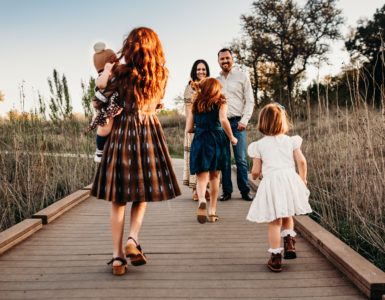What does “orphan” mean?
Per Merriam-Webster, an orphan is characterized as a child who has lost one or both of their parents to death. Or, in an even more subjective sense, an orphan can mean “one deprived of some protection or advantage.” This is a very broad definition, considering orphaned children can be located anywhere in the world. When thinking of an orphaned child, most people envision a child in a foreign country in an extremely impoverished situation. However, this is not always the case.
What does it mean to adopt an orphan?
Generally, the adoption process applies the same way when you adopt an orphan as it does to any other child that is placed for adoption. Adoption is where a child who is born to one set of parents is transferred to another set of parents who will assume legal guardianship.
Adopting a child who has been orphaned in any way is as complex a process as it is for a more “typical” adoption. Whether domestic or international, the adoption process can be lengthy for some. Prospective adoptive parents need to be aware that adoption is not something that can happen overnight; it involves multiple government agencies and hard work. This article provides an informative synopsis of the process to adopt an orphan, but the terminology from here on out will refer to “children who have been orphaned” or “an orphaned child”.
Domestic adoption can be conducted in a number of ways. Families can choose from several different types of adoptions, such as a closed, semi-closed, or open one by going through an agency, facilitating the adoption independently, or going through the foster care system. When a child that has been orphaned has been placed in foster care, they will either be placed in a group home or go into a foster home with a family until they either are adopted or age out of the system. “Aging out” means the child does not get adopted and they are no longer considered a “waiting child.”
International adoption will most likely be arranged by an international adoption agency that facilitates both in the United States and the country the child resides in, along with the Orphan Adoption Program (OAP) with the U.S. government. The OAP is a program through the Citizen and Immigration Services department that can help families navigate not only the adoption process but the challenges that deal with changing citizenship and arranging to bring the child to the U.S. from their home country. Filing the adoption paperwork is $720.00, which includes everything that you need to submit except for an $85.00 fee for each individual who is 18 years or older that is residing in the residence.
To file for adoption with the OAP, a person must be either married or at least 25 years old. If married, both spouses need to legally adopt the child or have the best intentions to. Persons interested in adopting through this program must establish that the child meets the qualifications to be considered an “orphan” as defined by the U.S. Citizen and Immigration Services and that they will provide adequate care for the child. Additionally, if the prospective adoptive parents have already filed and been accepted for adoption from another organization, they must have proof that the child is legitimate, meaning that they have seen them in person at least once at any point during the proceedings. If the child has not been adopted yet and the parents plan to do so in the U.S., they must have arrangements with the child’s home country for him or her to enter the U.S. to be adopted.
Those interested in using the Orphan Adoption Program need to review the Hague Process to ensure that they are eligible to use it. This policy was enacted in 2008 to protect all members of the adoption triad in “intercountry” adoption. If a child is being adopted from a country associated with the Hague Process, then the parent may not be eligible for the OAP.
International adoptions may also take other forms or be facilitated privately, however, this is much less common and sometimes can be harder to do.
Orphaned Children in Foster Care
In the United States, many children in the foster care system have been orphaned and do not have extended family to step in and provide guardianship. With the opioid crisis raging through the U.S., many children are being displaced on short notice into the system that is already overwhelmed. Due to the high number of incarcerations of those who have a substance abuse problem, and other unfortunate situations that can cause family separation, children are being orphaned at higher rates than in the past.
Adoptions through the foster care system are usually less pricey than other routes like an agency. Most times, the adoption costs only consist of nuanced fees such as costs associated with lawyer fees or the child’s well-being. This makes the adoption much more affordable for families.
Advice for Parents Looking to Adopt an Orphaned Child
For anyone planning to adopt an orphaned child, there is preparatory work that needs to be done well beforehand.
First, consider why you are wanting to adopt a child in this situation; what is your motivation? It is vital to make sure that you are adopting for the right reasons and are fully committed to raising the child to the best of your ability. A child coming into your home needs to feel welcomed and loved unconditionally, no matter what.
Secondly, let your child share their story only if they want to and if they feel comfortable doing so. Many times, adoptive parents are eager to share their child’s story and tell other people about their journey to help other families who are looking to adopt. This can happen in religious settings, around family and friends, or at their school. However, even if the story is brought up in casual conversation and there is no harm or bad intent meant by sharing it, it is still not a parent’s story to tell. An orphaned child may have been through an extremely traumatic experience before they were adopted and will most likely still be dealing with the aftermath of it. Bringing their past up, even in the smallest of ways, when they are not ready or are unprepared to do so can cause additional trauma.
From an adoptee’s perspective, these two things are probably the most important things an adoptive parent can do. Growing up as a transracial adoptee, I experienced significant challenges with my cultural identity. I am biracial (Black and White) and was raised in a predominantly White area by a White family. I did not have any traumatizing experiences regarding my identity; however, people were always questioning my ethnicity or whether I was born in the United States. This made me feel like a complete outsider in my own community from a young age. Many people who are not adoptees do not realize the lifelong impact adoption can have on a child. I am continuously grateful that I had supportive parents who allowed me to embrace my identity as a biracial girl and encouraged me to be curious about everything.
Terminology: What’s correct?
While technically accurate in describing a child without parents, “orphan” is consequently an outdated term. A child who has lost one or both of their parents is simply that, or in more reductive terms, a child. Labeling children in these unfortunate situations only adds to the trauma they have and might continue to experience. Additionally, the term “orphan” is no longer used colloquially; it is only used in legal terms to define the status of a child for government and international adoption programs.
It is pertinent to use the current and updated terms to move away from the archaic nature of adoption in the past. The adoption community, both domestic and international, is evolving rapidly to be more attentive to all those involved with adoption—no matter what their role is. Terms that could be construed as a derogatory word need to be evaluated and eliminated.
Terminology also extends to things that prospective adoptive parents will need to be familiar with. Acquiring the basic knowledge of what you will be discussing with government agencies, lawyers, and the international or domestic adoption agency is one of the most important things to do in your preparatory process. Some terms have a legal basis, meaning they can get quite confusing—especially for those unfamiliar with legal jargon. Different legal websites have created dictionaries of these terms for those looking to adopt, such as FindLaw. Some terms from there to be familiar with when adopting an orphaned child are:
- Transracial Adoption: when a child is adopted by a family that is a different race or ethnicity than him or her.
- Closed Adoption: a type of adoption where the biological parents and the adoptive parents do not meet, exchange any information, or have any contact after the adoption takes place.
- Open Adoption: a type of adoption where the adoptive and biological parents have continuous contact throughout the adoption process.
- Intercountry/International Adoption: a type of adoption where the child is adopted from a different country than the adoptive parents.
- USCIS (U.S. Immigration and Citizen Services): part of the federal government that assists families trying to gain U.S. citizenship for an adopted child from outside the U.S. and approves the child’s immigration to the U.S.
Psychological Impact of Adoption
When adopting a child under any circumstance, there is a level of psychological trauma they may undergo. Dealing with the aftereffects of adoption can be challenging for both the adoptive parents and the adoptee. Adoptees, no matter where or at what age they were adopted, can struggle with their identity.
Adopting from another country, especially one that has a completely different culture than that of the U.S., can be a confusing and chaotic experience for a child. The older the child, the harder the transition can be since they have been immersed in their birth culture more than a newborn baby would have been. Perhaps one of the most meaningful and important things an adoptive parent can do is keep their child connected to healthy sources of his or her birth culture. Even if the child is adopted as a baby or a toddler, providing opportunities for them to learn about their cultural history will not only help them strengthen their cultural identity, but also create a special relationship between the adoptee and their adoptive parents.
For example, it is completely normal for children to want to seek out their biological family. For those born in the United States, there are more opportunities to reconnect with birth family than in international adoption. Most children adopted internationally may never have the opportunity to know anything about their biological family other than very basic information. To say this is devastating would be an understatement. While the adoptive family may not be able to “make up” for the loss or absence of the biological family, they can do their best to be supportive of the child’s curiosity and share any information that is truthful and age-appropriate. This can also be hard for the adoptive parents to handle if they take their child seeking out this information as an insinuation that they are inadequate parents or have not provided enough. However, the more supportive a parent can be, the higher the chance that both they and their child will have a happier outcome.
In more extreme cases, an orphaned child can be diagnosed with a psychological disorder such as post-traumatic stress disorder (PTSD), an attachment disorder such as reactive attachment disorder (RAD), a mood disorder, anxiety, or depression. Seeing a psychologist or therapist is imperative if your child is diagnosed with one of these disorders.
Finally…..
At the end of the day, adopting a child internationally or domestically can seem intense, especially if you have never been through the adoption process before. Be sure to do your research and be as prepared as possible to start your journey of adoption. It is an exciting, yet unfamiliar time in your life as well as your child’s. Having a positive outlook will make it all the more memorable as time goes by.
Do you feel there is a hole in your heart that can only be filled by a child? We’ve helped complete 32,000+ adoptions. We would love to help you through your adoption journey. Visit Adoption.org or call 1-800-ADOPT-98.




